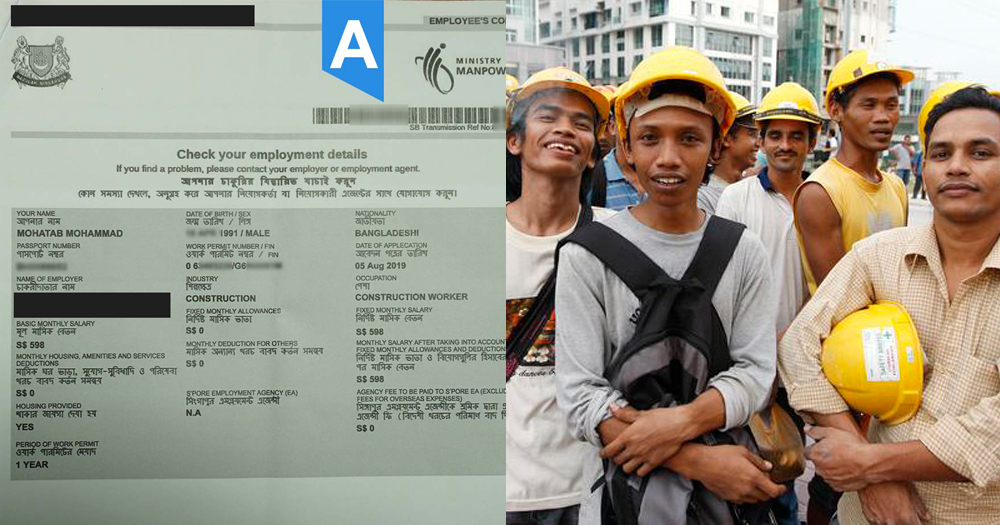Foreign workers cannot depend on current mandated documentation to protect them from unscrupulous employers.
This is the stand of two foreign worker advocacy groups, in response to Minister of State for Manpower and National Development Zaqy Mohamad.
No mandatory written contract necessary: Government
Zaqy mentioned in Parliament on Feb. 4 that foreign workers do not need a mandatory written contract.
This is because the Ministry of Manpower (MOM) has mandated that all foreign workers must be informed of key information in two ways:
- They must be given an In-Principle Approval letter before they depart to Singapore. This contains information such as occupation, basic monthly salary, fixed monthly allowances, as well as deductions.
- They must be given Key Employment Terms including their job title, main duties and responsibilities, place of work, work arrangements, salary details, leave entitlements, medical benefits, probation, and notice period within 14 days of their employment.
In-Principle Approval letters are unreliable as written arrangements
However, foreign worker advocacy groups Transient Workers Count Too (TWC2) and Humanitarian Organization for Migration Economics (HOME) told Mothership that In-Principle Approval letters are "extremely unreliable" as a written arrangement between employer and foreign worker.
Both mentioned how In-Principle Approval letters can be faked.
For example, a worker can received his letter prior to checking in at the airport; by then, it is too late to turn back.
Or, they might discover after starting work in Singapore that they were handed a fake letter back in their home countries.
You can find an example of fake In-Principle Approval letters here.
"We have come across incidences of workers who are not aware that their employers have changed their salaries as declared in the IPAs. They find out only when they lodge a salary claim with MOM for short payment," said Ethan Guo, General Manager of TWC2.
IPA substitution
Desiree Leong from HOME told Mothership that the organisation has observed a growing trend of "IPA substitution".
Below is one possible means of IPA substitution, according to HOME:
The worker receives an In-Principle Approval letter with a salary indicated in his home country. He enters Singapore with this letter.
When he realises that his employer has been paying him much less than agreed, he files a claim with MOM.
In order to deny the worker's claim, the employer cancels the original In-Principle Approval letter and applies for a new one with the reduced salary.
"In this way, the workers are being exploited by means of the very same official instrument that was intended to protect them from contract substitution," said Leong, adding that these are observations that HOME gleaned from reviewing the documents that workers bring to them.
Guo also told Mothership that some agents even downplay the importance of the In-Principle Approval letters.
They give the foreign worker a local contract that cannot be enforced outside of the country. Then when the workers come over to Singapore and realise that their salary is lower than agreed upon, they realise they have been exploited but cannot do anything.
Exploited with no bargaining power
Separately, Key Employment Terms were made compulsory since 2016 but according to Guo, TWC2 has hardly seen any workers with their Key Employment Terms.
"There has been no enforcement that we can observe," he said.
Echoing Nominated Member of Parliament Walter Theseira, Guo said that foreign workers are often exploited and have no bargaining power.
"Whatever they are asked to sign, they will sign, as their employers would otherwise threaten to send them home. They are often also asked to sign documents in a language they don't understand."
If you like what you read, follow us on Facebook, Instagram, Twitter and Telegram to get the latest updates.
